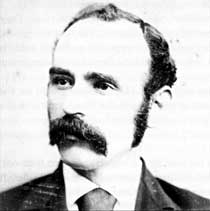1 June 2006 Edition
Remembering the Past

Michael Davitt
Michael Davitt
This year marks the 100th anniversary of the death of Michael Davitt, father of the Irish Land League and pioneer of social justice. His legacy of linking the cause of Irish freedom to the struggle for social equality remains of major relevance to republicans in 2006. Recent social struggles in Davitt's native County of Mayo, highlight again the importance of his ideas.
Davitt was born in Straide, County Mayo on 25 March, 1846. When he was six years old, his parents, Martin and Sabina Davitt, were evicted for non-payment of rent. Davitt's father travelled to England to find work. In 1845, Davitt's mother and her children joined her husband in the industrial town of Haslingden in Lancashire.
At the age of eleven, while working in a cotton mill, Davitt had his arm so badly maimed in an accident that it had to be amputated. At 16, while working for the local postmaster, he began evening classes in Irish history at the Mechanic's Institute. It was at this time that his thoughts began to turn to politics.
In 1865, he joined the IRB and two years later gave up his job to become organising secretary of the Fenians in the north of England and Scotland.
Davitt was arrested in London in 1870 while awaiting a delivery of arms, and was sentenced to 15 years hard labour. The next seven years were spent in complete isolation in prison, where he was compelled to work in inhuman conditions.
With other political prisoners he was released on ticket of leave in 1877 and subsequently became a member of the Supreme Council of the IRB.
After the Land League was suppressed in 1881, Davitt embarked upon a public career in which he advocated radical land and labour reforms and promoted the linking of the interests of agricultural and urban labouring communities.
Until his death in 1906, Davitt constructed a reform platform, demanding not simply Irish self-government, but also a decidedly democratic Irish state, to be ruled in the interests of the labouring classes.
He toured America with the active assistance of John Devoy, gaining the support of Irish Americans for his policy which was founded in the slogan The Land for the People. However, his activities did not have the official approval of the Fenian leadership, many of whom were openly hostile to his methods.
The year 1887 was one of three wettest years on record, the potato crop had failed for the third successive year, and the traditional escape route of emigration was virtually closed due to a worldwide economic depression.
At a large meeting attended by Davitt in Claremorris, plans were made for a huge gathering at Irishtown as part of agitation to reduce rents. The first target was land owned by a Canon Ulick Burke, and the result was an astounding success when the Canon was forced to reduce rents by 25%. On 21 Octobe 1879, the National Land League was formed in Dublin with Parnell as President, and Davitt as one of the secretaries.
In 1881 the Land league was able to hold a meeting in the local Orange hall at Loughgall. Davitt told the crowd that the "landlords of Ireland are all of one religion - their God is mammon and rack-rents, and evictions their only morality, while the toilers of the fields, whether Orangemen, Catholics, Presbyterians or Methodists are the victims."
In 1882 Michael Davitt was rearrested. On his release he travelled widely campaigning ceaselessly for the oppressed everywhere.
As an author, Davitt highlighted the plight of the underprivileged internationally including the Boers in South Africa, the Maoris in New Zealand, the Aborigines in Australia and the Jews in Russia, and people serving penal servitude. He was the author of six books- Leaves from a Prison Diary, Michael Davitt's speech before the Special Commission, Life and Progress in Australia, The Boer Fight for Freedom, Within the Pale and The Fall of Feudalism in Ireland.
In 1892 he was elected MP for Mayo but disliked the institution of parliament and became increasingly impatient with the inability or unwillingness to right injustice.
In 1899 Davitt resigned his parliamentary seat over the Boer War. In 1903 he visited
Russia and in 1904 he published The Fall of Feudalism. Davitt helped found the English Labour Party with Kerr Hardie in 1905
Michael Davitt died of acute septic poisoning in Elphis hospital, Dublin on 30 May 1906 at the age of 60. Not wishing to have a public funeral, Davitt's body was brought quietly to the Carmelite Friary, Clarendon Street, Dublin. Over 20,000 people filed past his coffin the next day. It was was then brought by train to Foxford, County Mayo.
On 30 of May 1906,100 years ago, Michael Davitt died.



